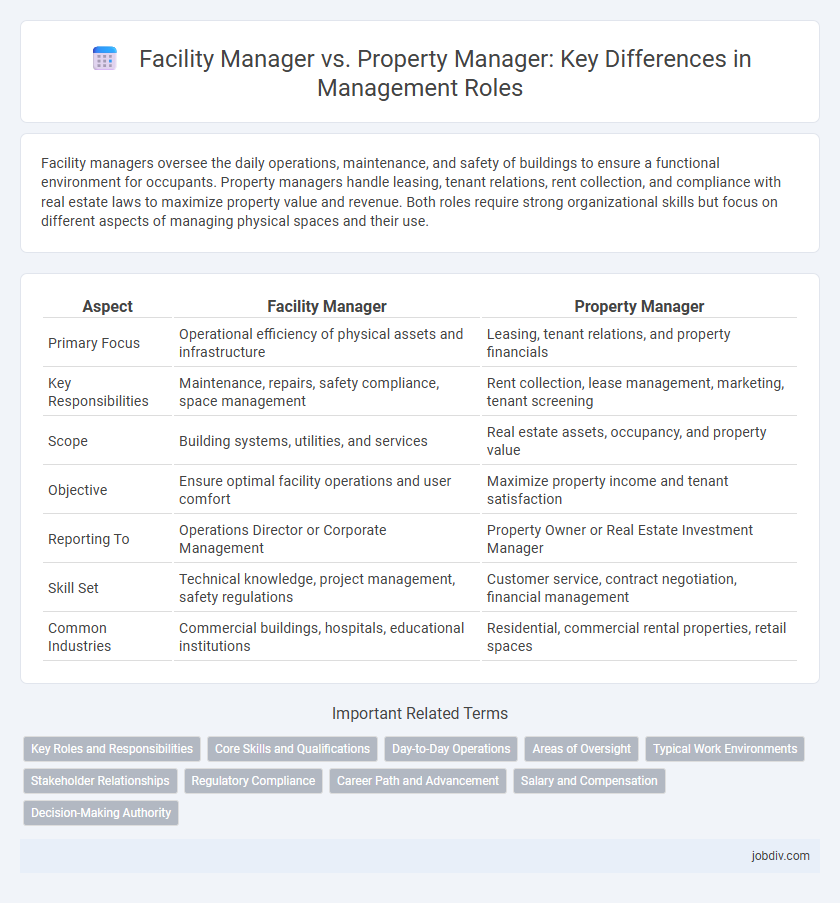Facility managers oversee the daily operations, maintenance, and safety of buildings to ensure a functional environment for occupants. Property managers handle leasing, tenant relations, rent collection, and compliance with real estate laws to maximize property value and revenue. Both roles require strong organizational skills but focus on different aspects of managing physical spaces and their use.
Table of Comparison
| Aspect | Facility Manager | Property Manager |
|---|---|---|
| Primary Focus | Operational efficiency of physical assets and infrastructure | Leasing, tenant relations, and property financials |
| Key Responsibilities | Maintenance, repairs, safety compliance, space management | Rent collection, lease management, marketing, tenant screening |
| Scope | Building systems, utilities, and services | Real estate assets, occupancy, and property value |
| Objective | Ensure optimal facility operations and user comfort | Maximize property income and tenant satisfaction |
| Reporting To | Operations Director or Corporate Management | Property Owner or Real Estate Investment Manager |
| Skill Set | Technical knowledge, project management, safety regulations | Customer service, contract negotiation, financial management |
| Common Industries | Commercial buildings, hospitals, educational institutions | Residential, commercial rental properties, retail spaces |
Key Roles and Responsibilities
Facility Managers oversee the maintenance, safety, and operational efficiency of physical buildings, including HVAC systems, cleaning services, and workplace environment optimization. Property Managers focus on tenant relations, lease administration, rent collection, and ensuring compliance with real estate regulations. Both roles require strong organizational skills but differ in scope, with Facility Managers handling internal infrastructure and Property Managers managing external stakeholder interactions.
Core Skills and Qualifications
Facility Managers require expertise in building systems, maintenance coordination, and health and safety compliance, ensuring operational efficiency and regulatory adherence. Property Managers focus on tenant relations, lease administration, and financial oversight, optimizing occupancy rates and revenue streams. Both roles demand strong organizational skills, effective communication, and knowledge of relevant industry standards.
Day-to-Day Operations
Facility Managers oversee daily operations related to building systems, maintenance, and safety to ensure efficient functionality within the facility. Property Managers handle tenant relations, rent collection, leasing, and overall property financial management. Facility Managers focus on operational infrastructure, while Property Managers concentrate on tenant services and financial performance.
Areas of Oversight
Facility Managers oversee the day-to-day operations, maintenance, and safety of building systems, including HVAC, electrical, and cleaning services to ensure a functional workspace. Property Managers focus on tenant relations, lease agreements, rent collection, and compliance with local property laws to optimize occupancy and profitability. Both roles require managing budgets and vendor contracts but differ fundamentally in operational scope and stakeholder engagement.
Typical Work Environments
Facility managers typically operate in environments such as corporate offices, hospitals, manufacturing plants, and educational institutions, ensuring physical infrastructure and systems are maintained efficiently. Property managers usually work within residential complexes, commercial real estate, and rental properties, focusing on tenant relations, lease agreements, and real estate asset management. Both roles require navigating regulations and optimizing space utilization, but facility managers emphasize operational logistics while property managers prioritize tenant services.
Stakeholder Relationships
Facility Managers focus on maintaining operational efficiency and ensuring the physical workplace supports business activities, fostering strong relationships with internal stakeholders such as employees and department heads. Property Managers prioritize maximizing rental income and tenant satisfaction, managing external relationships with property owners, tenants, and service contractors. Both roles require effective communication and coordination, but Facility Managers engage more with organizational stakeholders while Property Managers liaise primarily with external parties.
Regulatory Compliance
Facility managers ensure regulatory compliance by overseeing workplace safety standards, environmental regulations, and building codes within operational facilities. Property managers focus on legal adherence related to tenant leases, zoning laws, and property maintenance regulations to avoid violations and penalties. Both roles require up-to-date knowledge of local, state, and federal laws to maintain compliance and reduce organizational risk.
Career Path and Advancement
Facility Managers often begin their careers with technical roles in building systems or maintenance, advancing to oversee operations and workplace efficiency within organizations. Property Managers typically start in leasing or tenant relations, progressing to manage multiple properties or portfolios with a focus on real estate asset value and tenant satisfaction. Career advancement for Facility Managers leans toward corporate management roles or specialized facilities consulting, while Property Managers often move into real estate investment, development, or senior portfolio management positions.
Salary and Compensation
Facility Managers typically earn a median salary ranging from $60,000 to $90,000 annually, reflecting their responsibility for operational efficiency and maintenance of physical assets. Property Managers often receive a broader compensation package, including base salary plus commission or bonuses, with average earnings between $50,000 and $85,000 per year, depending on portfolio size and rental income. Salary variations are influenced by geographic location, experience level, and the complexity of managing commercial versus residential properties.
Decision-Making Authority
Facility Managers typically have decision-making authority over day-to-day operational aspects such as maintenance, safety protocols, and equipment management. Property Managers hold broader decision-making power related to tenant relations, leasing agreements, and financial management of the property. The distinction in authority reflects the Facility Manager's focus on operational efficiency, while Property Managers concentrate on strategic management and profitability.
Facility Manager vs Property Manager Infographic

 jobdiv.com
jobdiv.com